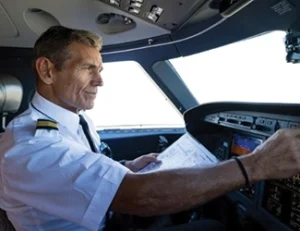 Lisa Archambeau
Lisa Archambeau
VP, Facilitator & Strategist
ServiceElements International
Almost all advice regarding pilot retention boils down to compensation and quality of life, and for good reason. Compensation must be fair, of course, but it should also be competitive, both with other local or regional corporate operators and with airlines whose attractive offers may lure pilots away at any time. And quality of life implies an immutable fact: that humans have needs and a life outside of our jobs.
However, these two topics – compensation and quality of life – are not as self-explanatory as they may first seem. To truly maximize pilot retention in your organization, you must invest the time to fully understand and embrace these key assets.
Compensation: With airlines aggressively refilling their rosters with the promise of high salaries, signing bonuses, and schedule stability, offering fair compensation is a must for any business aviation operator wishing to retain its pilots.
But what compensation is fair? Younger pilots such as millennials and those from “Gen Z” are often maligned for not necessarily wanting to stay with one job and one location for their entire career. However, if the high cost of living in an area prevents them from being able to buy a house and raise a family at their current pay rate, can we blame them for looking elsewhere?
Many things are important for a pilot’s well-rounded life, like family, salary, and good health. They also need extensive training and knowledge to operate complex aircraft safely, and require critical skills like situational awareness, clear communication, and decision-making under pressure.
With the current pilot shortage, it is clear that the determination of fair compensation cannot come solely from within the company. More than a few organizations have learned that the pilot salaries they had been paying were not commensurate with those offered by other operators of similar size.
The NBAA Compensation Survey provides a great comparison of some key roles in business aviation, including pilots, breaking them down even further with distinctions such as copilots, captains, international flying, and larger cabin/long-range aircraft.
In addition, companies such as AirComp Calculator work directly with organizations and their HR departments to analyze compensation packages, and provide data and education regarding industry standards.
Other compensation: Any consideration of compensation should also include the healthcare and retirement plans offered to flight personnel. If these benefits only kick in after a certain amount of time, is that period comparable that offered by operations similar to yours? Robust retirement plans can be very attractive to pilot candidates.
If yours is a smaller company, and thus not in a position to offer retirement contribution matches at the beginning of employment, consider matches that increase with each year of service to incentivize employees to stay.
Quality, comprehensive healthcare plans can also influence an individual’s decision to remain with their current employer, especially if their family is covered as well. Is there access to high-quality health care in your area, or are the major providers a considerable distance away? If the answer is the latter, consider reimbursing transportation costs or allowing paid time off for routine (or other) medical care.
Smaller companies can apply this same “step-up” principle to pilot salaries by offering a predetermined annual salary increase based on a set number of years of employment, or by providing opportunities for ancillary duties with corresponding pay increases.
Other compensation types include education benefits, such as tuition reimbursement, and aviation-specific leadership and professional development programs. In addition, learning opportunities such as business aviation forums and conferences provide further financial incentives to remain with a current employer.
Quality of life is an even broader category than compensation. Business aviation leaders may be tempted to think of this solely in terms of work/life balance, and the number of days their pilots have off each month. In truth, quality of life is specific to each individual and is more about organizational culture than work/life balance alone.
Organizational cultures that clearly value their team members increase individual engagement (ie, a person’s emotional attachment to the workplace) and make it harder for members to choose to leave for another company.
In our leadership boot camp workshops and our private coaching sessions, we emphasize that today’s business aviation leaders need to take the time to get to know each of their employees, learning what’s important to each individual, both at work and outside of it. What are their strengths? What do they enjoy doing? This should not be a one-time conversation, but rather periodic discussions which will help leaders understand each pilot’s individual motivation.
 By combining employer benefits with smart saving habits, and considering potential health concerns, corporate pilots can build a secure and robust retirement plan.
By combining employer benefits with smart saving habits, and considering potential health concerns, corporate pilots can build a secure and robust retirement plan.
The following are some of the major motivating factors that provide a high quality of life for pilots. Pilot retention relies on your knowing which ones are most important to each of your pilots.
Well-being: A person’s well-being (physical, mental, and social) is fundamental to their ability to perform their job well. With its constant disruption of circadian rhythms, routine exercise, and meal plans, as well as its high-pressure environment, the pilot lifestyle can be a challenge to well-being, even for those who love the job.
Pilots are more likely to stay with operations where they are provided with time and encouragement for exercise, sleep, healthy eating, and activities and relationships outside of work. Do your crew members receive consecutive “hard days” off weekly or monthly? Are they able to plan a 2-day trip with family and friends without being on call or having to take vacation days? If you are considering giving pay raises but struggle to give your pilots fixed time off, consider hiring an additional pilot instead to lighten the load.
Clear path for advancement: Many pilots – especially those from more recent generations – are looking for professional development and a path for career advancement to be mapped out early on. Major airlines approach current college students with the offer of a well-defined career track, complete with corresponding pay increases.
Universities with aviation programs offer advanced management degrees, resulting in graduates who have a strong desire to move into leadership positions despite possessing little practical experience. Traditionally, business aviation operations have not had set career progression paths.
This is especially apparent in small operations where the management positions that exist (ie, director of aviation and chief pilot) only become available when someone is promoted, retires, or otherwise leaves the company. If your organization does not already have defined levels of advancement, consider what meaningful stages may work for you.
Some departments have phases for second-in-command with parameters specific to each phase, allowing them to hire pilots whose relatively low time is offset by their “cultural fit” with the organization combined with a positive attitude and passion for business aviation.
Other flight operations have specific, well-defined stages for pilots, increasing in responsibilities and pay at each stage. Examples of these stages are reserve captain, senior captain, international captain, and safety officer.
With pilots who are eager for a defined path for advancement, it is important to communicate with them about the possibilities and the expectations you have for them to advance. Provide specific feedback to help them improve and know where they stand.
Even if you are developing an individual who may need to leave your organization eventually in order to reach their career goal, you will likely have retained them substantially longer than you would have otherwise, and you’ll have strengthened the business aviation industry as well.
Career agency: Like other employees, pilots want to self-regulate and control their own career journey. Having a job that is interesting, challenging, and meaningful is motivational for most employees, but what that looks like is different for each person.
Does your operation allow pilots to choose among collateral duties like safety committees, manual updating, or career fair participation? Studies show that some pressure and stress is good for productivity and performance.
Optimal pressure is where we are stretching, growing, and moving out of our comfort zone. Too much pressure, of course, can cause burnout and stress, as well as compromise safety. However, too little pressure can cause boredom and complacency, and also compromise safety.
Leaders must balance career agency with accountability. Dysfunctional departments where everyone operates by their own rules with no accountability increases risk and will drive away your high performers.
There is, unfortunately, no plan to ensure that you retain 100% of your pilots. However, being very intentional about your total compensation (not salary alone) and the quality of life that your organizational culture provides will make a significant difference.
As part of your culture of valuing each employee, be sure to communicate your retention plan with your staff. Letting them know you recognize their contributions to the team and want to keep them engaged adds to the trusting relationship with you as their leader.
